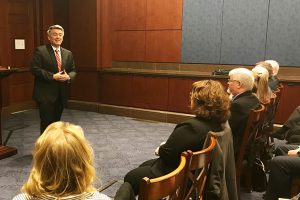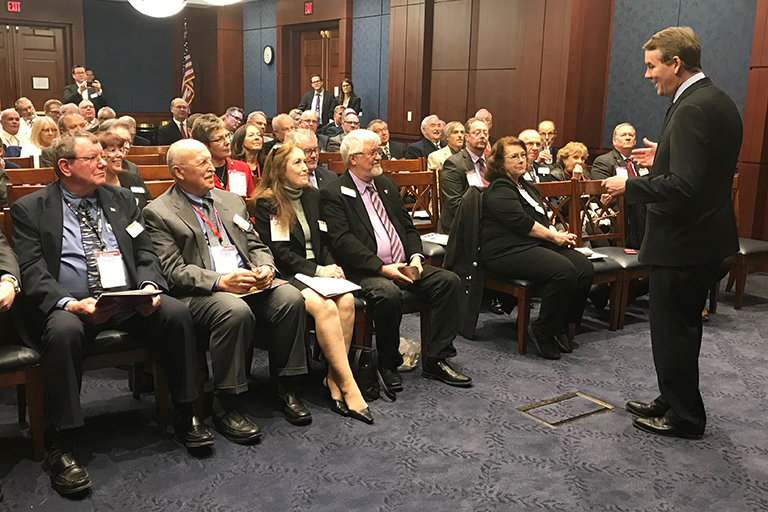Co-op funds in the Farm Bill, protecting the power marketing administrations that supply low-cost electricity to electric co-ops and others, and investing in rural broadband were all part of the focus of the 2018 NRECA Legislative Conference in Washington, D.C.
About 75 representatives of Colorado’s electric cooperatives gathered with close to 2,000 other co-op representatives at the April 8-11 conference hosted by the National Rural Electric Cooperative Association, the co-ops’ national trade association. Led by the Colorado Rural Electric Association staff, the Colorado co-op directors, managers and employees brought their concerns to the attention of Colorado’s congressional delegation.

Sen. Cory Gardner (R) takes time to discuss important issues with Colorado electric cooperative members.
There were meetings with Sens. Cory Gardner (R) and Michael Bennet (D), and with Reps. Jared Polis (D), Scott Tipton (R), Mike Coffman (R) and Ed Perlmutter (D). Staff members from the offices of Reps. Diana DeGette (D), Ken Buck (R) and Doug Lamborn (D) also met with co-op representatives.
The co-ops appreciate that everyone in Colorado’s delegation supports the $5.5 billion in the federal farm bill for the Rural Utilities Services electric co-op loan program. Colorado’s senators and representatives are also supportive of the other loan and grant programs in the bill that will assist co-ops as economic development organizations in their rural communities.
The co-op group did ask the senators and representatives to turn back the administration’s budget proposal to sell the transmission assets of the power marketing administrations, which the co-ops and other utilities paid for over the years and which provide cost-based rates that help keep public power rates stable. The group also asked the delegation to support a permanent loan-grant program through RUS that will help overcome the high-cost barriers of bringing high-speed internet services to rural America.
Other issues that were part of the meetings included Federal Emergency Management Agency reform that will maintain the commitment to disaster recovery while streamlining the process of accessing FEMA funds; modernization of the Public Utilities Regulatory Policies Act of 1978 (PURPA) to address today’s electricity market; support for the Low-Income Home Energy Assistance Program, and support for H.R. 1873, the Electricity Reliability and Forest Protection Act that streamlines rights-of-way reviews and timelines to ensure reliability and reduces the risk of fires and fire hazards on rights-of-way across federal lands.
There were great discussions, questions and dialogue in each of the meetings during the time in D.C.

